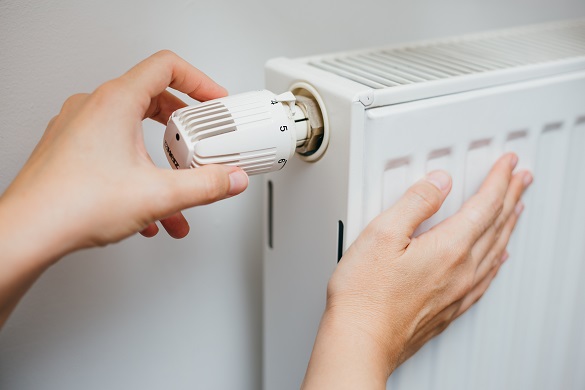Central heating — what is it and how much does it cost to install?
A home needs central heating as much as it needs a roof or doors. In the UK, when the colder months arrive, it’s important to have a system that provides hot water and heating throughout.
We’re going to look at the different types available, the cost of central heating, and what’s involved in installation.
Gas central heating installation costs
Modern central heating systems are much more efficient than they used to be. Today, they use a lot less fuel to run while still providing the same amount of heat.
In simple terms, the cost of central heating means paying for a boiler, heating controls, pipework, and radiators. Sometimes you’ll have a water tank too. Installing all these parts requires a significant amount of work. Of course, the larger the house, the more work needed, and the more it’s all going to cost. On average, this can fall anywhere between £2000 and £5000.
Hiring a plumber to install your central heating will usually cost somewhere between £150 to £270 per day. As we said, central heating installation is a big job so it could even need more than one plumber to complete it.
Depending on the type and difficulty of the job, it’ll usually take a week or two to complete. For a new system, labour costs will usually fall somewhere between £1,000 to £2,000.
Labour rates are higher in London and the South East. Therefore, you can expect to pay £200 to £500 more on top compared to the rest of the UK.
If you’re unsure of the type of boiler you might need, you can learn more by reading Combi, conventional and system boilers: what's the difference?
House type and size

The size of the house will affect the cost of installing central heating. If there are more rooms to heat, there’ll be a greater need for more radiators. The amount of power needed to supply water around the house will help you to decide on the boiler size you need.
To give you a rough idea, central heating in a bungalow with five to six radiators and a 24kW boiler will cost £2,000 to £2,600.
Central heating in a terraced house with six to nine radiators and a 28kW boiler will cost between £3,500 to £4,000.
Central heating in a semi-detached house with 10 to 12 radiators and a 33kW boiler, will cost between £4,000 to £4,500. A detached house with 12 to 15 radiators and a 33kW boiler will cost between £4,500 to £5,000.
Number of radiators

Radiator efficiency is measured in British Thermal Units (BTUs). The higher the number of BTUs, the faster the radiator can heat the surrounding space. Central heating radiator sizes tend to have a BTU output of anywhere between 600 and 10,000.
Generally, you should have one radiator for every 5m³ of space you need to heat. You can work out the volume of the space you need to heat using this formula. Multiply the length of your room by its width and height in metres: L (m) x W (m) x H (m) = volume (m³).
You'll then need to work out the BTUs required to heat the room. You do this by multiplying the volume (m³) of the room by 153: Room volume (m3) x 153 = BTUs required to sufficiently heat the room.
If your maths isn’t up to scratch, there are plenty of BTU calculators available online. These will do all the hard work for you, helping you work out how many radiators you need and what size they should be.
To fit a single radiator, you can expect to pay anywhere between £150 to £250 for labour in the UK.
Boiler size
Everyone knows boilers aren’t cheap. Which is why it’s important to make sure you choose the right one for your home.
When we talk about the size of a boiler, we don't mean the actual size of it on your wall, but its output in kilowatts (kW). The more heat and hot water you need for your home, the higher the kW output will be.
Be careful though. Simply choosing the most powerful boiler could end up costing you more to run and wasting energy.
To work out the size of boiler that’s right for your home, you need to know the necessary power output. To get a general idea, add up the number of radiators you’ll need in your home (as discussed in the previous section). Then use the following scores:
For a combi boiler:
- Up to 10 radiators: 24 — 27 kW
- 10 to 15 radiators: 28 — 34 kW
- 15 to 20 radiators: 32 — 40 kW
For a conventional or system boiler:
- Up to 10 radiators: 12 — 15 kW
- 10 to 15 radiators: 18 — 24 kW
- 15 to 20 radiators: 30 — 40 kW
Combi boilers use more power. They heat water rapidly on demand, rather than circulating hot water around a cylinder as the other two do.
Remember, this is only to give you a rough idea of the boiler power requirements you’ll need. A Gas Safe registered engineer will be able to give you a more accurate recommendation. They’ll also consider other factors. These include the size of your home, how well insulated it is, and water pressure.
Oil central heating
Most homes in Great Britain use gas central heating. Yet around 5% of homes rely on oil to heat their homes. These tend to be ones that aren’t connected to the main gas grid. A lorry will deliver heating oil where it's stored in a tank near the house.
An oil-fired boiler heats water which then provides central heating via radiators and hot water to the taps in the home.
As a long-term solution, oil central heating might not be the best option. The Government plans to phase out fossil fuel heating, such as oil, as set out in the Clean Growth Strategy. This strategy sets out the proposals for decarbonising all sectors of the UK economy through the 2020s. In fact, any new homes built after 2025 aren’t allowed to have any oil heating.
If they’re in good working order, homes with oil heating systems won’t need to replace them just yet. But it's worth thinking ahead about what to replace them with when the time comes.
Electric central heating
There are three types of set-ups you can have when it comes to using electricity to heat your home.
- Electric radiators
- Electrical central heating (with an electric boiler)
- Storage heaters
Many electric heating systems have separate heaters in each room, rather than a central boiler. As they don’t run on water, they use either thermal fluid or dry elements to radiate heat.
Heating water in an electric boiler (or immersion heater) works in much the same way as a kettle. An electric heating element warms the water before transferring it to taps throughout the home.
Storage heaters heat up overnight, when electric rates are cheaper, and release the heat over the following day. The downside to this is that once the heat runs out, you’ll have to wait until the next night for them to reheat.
While most homes in Great Britain use gas central heating, almost all have access to the electric grid. So, it’s an option available to most. The efficiency of modern electric heating is excellent, with almost 100 per cent of electrical energy converted to heat. However, while they're an obvious greener option for central heating, they're more expensive to run compared to gas.
But electric heating systems are easier and cheaper to install than gas. They don’t need flue or pipework so there's no need to mess about with building layout, design or planning. All that's needed is a connection to the electric grid. For new build properties, this means it can all be nicely completed at the same time.
Installing other types of central heating
We’ve covered the main types of central heating available, but there are other options available, namely renewable heating. Options include:
- Solar thermal systems which absorb the sun’s energy through solar panels
- Biomass stoves which burn compressed wood or organic matter pellets
- Air or ground source heat pumps which absorb heat from the air outside or from the ground, before releasing it inside
You can learn more about heat pumps in our article on What are heat pumps and how do they work?
Infrared heating systems are also becoming more popular. Rather than heating the surrounding air, infrared panels directly warm objects and people in the room. This works via infrared radiation waves, in the same way infrared rays from the sun feel warm on our skin. Infrared light isn't visible, nor does it contain UV light, but it gets absorbed by our skin. So, the homes of the future may be heated by the mirrors or artwork on the walls!
The table below provides a rough idea of how much you can expect to pay to install heat pumps or a solar thermal system.
How to get a new central heating system installed
You may think that having your radiators replaced at the same time will cost more but you’ll actually save money. The engineer will need to drain the system anyway, so it'll be a much easier and quicker job.
Additionally, some engineers may give you a discounted price for changing your boiler and radiators at the same time. Plus, combining the efficiency of a new boiler and new radiators will save you money on your heating bills.
A Gas Safe registered engineer must install your boiler. It's not a job you should even think of doing yourself (unless you’re a Gas Safe registered engineer of course). On the other hand, fitting radiators is something that, with a degree of know-how, you could do yourself. By sticking to the same width radiators and pipework positioning, a competent DIY enthusiast could find they save some money doing the job themselves.
If boilers is a subject that leaves you scratching your head, we can help you learn more about which boiler is the right one for your home.
Paying for a new central heating system

Replacing your central heating system can be expensive. Quotes for installation and parts can vary a lot depending on who you talk to. You should always try and get quotes from more than one company.
Struggling on with an old or inefficient system may cost you more in the long run. More often than not, you shouldn’t need to replace the pipework (which is where things can get costly).
As it’s such a large expense, you might want to consider spreading the cost of a new central heating system. Speak to your energy provider about a finance plan with monthly payments. Some energy providers can also help by conducting a survey to estimate the cost and explain what’s involved in the installation of a new system.
Grants to cover the cost of installing new central heating
The Government is investing £12 billion in energy grants through Help to Heat schemes. These initiatives are designed to help make homes warmer and cheaper to heat. They’re funded via installers, local authorities, energy companies and other bodies.
These are some of the main schemes:
- Boiler Upgrade Scheme — grants to install low carbon heating systems such as heat pumps.
- Local Authority Delivery Scheme (Sustainable Warmth Competition) — funding to English local authorities for upgrading energy inefficient homes of low-income households
- Home Upgrade Grant (Sustainable Warmth Competition) — energy efficiency measures and low carbon heating for low-income households living in off gas grid homes in England.
- Social Housing Decarbonisation Fund — this aims to upgrade a significant amount of the social housing stock currently below EPC C (the standard energy efficiency rating).
- Energy Company Obligation (ECO) — energy suppliers are required to help households reduce the costs of their home heating by providing energy saving measures.
Take a look to see if your property is eligible for Help to Heat funding.
How to tell if you need new central heating

If you suspect your current heating system isn’t operating at its most efficient, it may be time to upgrade or replace your central heating system.
You may notice that your boiler is making strange sounds or labouring. If it’s over 10 or 15 years old, it'll be less efficient, especially if it isn’t being regularly serviced. In fact, about 25% of the energy you’re paying is going up the flue — literally. Modern boilers on the other hand are highly efficient and provide excellent value for money. If you’re having issues with yours, it’s worth checking first to see if you can fix it with one of these simple tips.
Perhaps there are cold spots around the house and radiators that don’t warm up fully. This can be a sign that your heating system isn’t working as it should be. Breakdowns of either boilers or radiators are a sign of bigger issues at play. It's difficult to repair older ones as parts become harder to source. However, we do offer a boiler repair service.
Finally, another point you should consider is how much you’re paying for your energy. We've seen energy bills spike over the last year or so. But if you’re paying more than your neighbours are (you may need to politely enquire), you should investigate why.
Have questions?
Our blog is loaded with more related articles

Plumbing and heating tips
Heating not coming on? There could be a simple fix...
It’s that time of year again, one of the busiest for heating engineers, when people start to turn their heating on after...
Read more

Energy saving tips
How to insulate your home and save money
Just like we put on layers in winter, our houses need to wrap up too — that’s what insulation is for. By keeping th...
Read more

Boiler help and advice
How to choose a new boiler
When the time comes to replace the boiler, it’s easy to fall into the trap of choosing the cheapest option that works &md...
Read more
